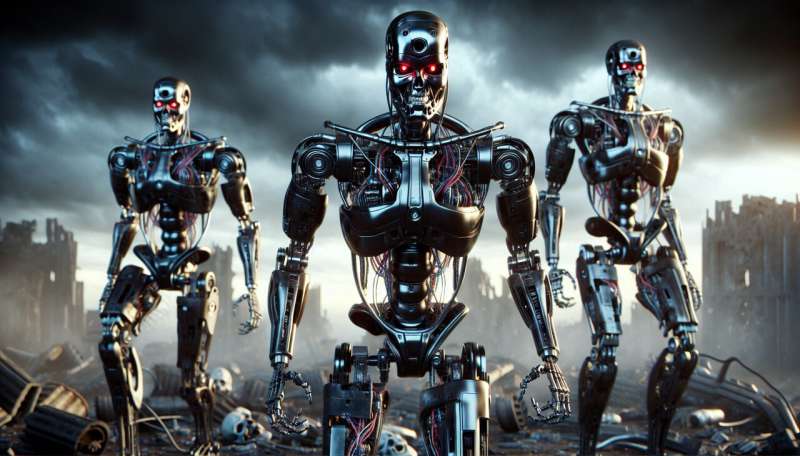This article has been reviewed according to Science X's editorial process and policies. Editors have highlighted the following attributes while ensuring the content's credibility:
fact-checked
peer-reviewed publication
trusted source
proofread
Terminator-style robots more likely to be blamed for civilian deaths

Advanced killer robots are more likely to be blamed for civilian deaths than military machines, new research has revealed. The University of Essex study shows that high-tech bots will be held more responsible for fatalities in identical incidents.
Led by the Department of Psychology's Dr. Rael Dawtry, it highlights the impact of autonomy and agency, and it shows people perceive robots to be more culpable if described in a more advanced way.
It is hoped the study—published in The Journal of Experimental Social Psychology—will help influence lawmakers as technology advances.
Dr. Dawtry said, "As robots are becoming more sophisticated, they are performing a wider range of tasks with less human involvement."
"Some tasks, such as autonomous driving or military uses of robots, pose a risk to peoples' safety, which raises questions about how—and where—responsibility will be assigned when people are harmed by autonomous robots."
"This is an important, emerging issue for law and policymakers to grapple with, for example, around the use of autonomous weapons and human rights."
"Our research contributes to these debates by examining how ordinary people explain robots' harmful behavior and showing that the same processes underlying how blame is assigned to humans also lead people to assign blame to robots."
As part of the study, Dr. Dawtry presented different scenarios to more than 400 people. One saw them judge whether an armed humanoid robot was responsible for the death of a teenage girl. During a raid on a terror compound, its machine guns "discharged" and fatally hit a civilian.
When reviewing the incident, the participants blamed a robot more when it was described in more sophisticated terms despite the outcomes being the same.
Other studies showed that simply labeling a variety of devices, 'autonomous robots, ' leads people to hold them accountable compared to when they were labeled 'machines.'
Dr. Dawtry added, "These findings show that how robots' autonomy is perceived—and in turn, how blameworthy robots are—is influenced, in a very subtle way, by how they are described."
"For example, we found that simply labeling relatively simple machines, such as those used in factories, as 'autonomous robots' lead people to perceive them as agentic and blameworthy, compared to when they were labeled 'machines'."
"One implication of our findings is that, as robots become more objectively sophisticated, or are simply made to appear so, they are more likely to be blamed."
More information: Rael J. Dawtry et al, Hazardous machinery: The assignment of agency and blame to robots versus non-autonomous machines, Journal of Experimental Social Psychology (2023). DOI: 10.1016/j.jesp.2023.104582
Journal information: Journal of Experimental Social Psychology
Provided by University of Essex




















